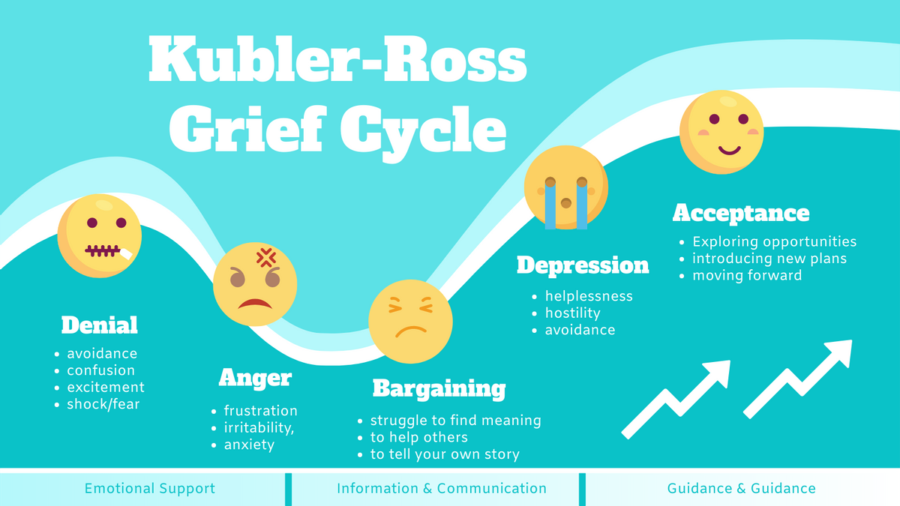Nothing prepares us for any kind of loss, and losing a loved one might just be the most daunting feeling ever. So, just how much more depressing is losing a parent? Tragic. As someone who lost a parent nine months ago, one would think I’d have healed by now because apparently, time heals, but almost a year in, it still feels like doing back flips on a slippery slope. The grieving process seems never-ending. Grief is typically conceptualized as a reaction to death, though it can occur anytime. The reality is, it’s not what we wanted, hoped for, or expected.
Parents bring a sense of reason, comfort, and overall secure existence into our lives. Knowing you can pick up the phone and ask parents for advice on a recipe is comforting. What happens when a parent dies? You grieve – grieving allows you to honor their memory, feel the pain of the loss, accept the death and actually get to a place of serenity. Grieving is a time of feeling intense sorrow; it’s quite a complex period in your life, an untimed and unpredictable process because you can be fine today and reality hits you again tomorrow. If you have lost a loved one and are currently grieving, it’s important to note the grieving stages so you can better understand the process.

Elisabeth Kubler-Ross developed the five stages of grief in her 1969 book, On Death and Dying popularly referred to as DABDA. Being aware of the grief stages and how you uniquely experience them can increase self-understanding and compassion. It can help you better understand your needs and prioritize getting them met.
THE 5 STAGES OF GRIEF
DENIAL
Denial helps us minimize the overwhelming pain of loss. As we process the reality of our loss, we are also trying to survive emotional pain. It can be hard to believe we have lost an important person in our lives, especially when we may have just spoken with them the previous week or even the previous day. During this stage in grieving, our reality has shifted completely. It can take our minds time to adjust to our new reality. We reflect on the experiences we’ve shared with the person we lost, and we might find ourselves wondering how to move forward in life without this person.
Denial is not only an attempt to pretend that the loss does not exist. We are also trying to absorb and understand what is happening.
| WHAT IT LOOKS LIKE | WHAT IT FEELS LIKE |
| Avoidance | Shock |
| Procrastination | Numbness |
| Forgetting | Confusion |
| Easily distracted | Shutting down |
ANGER
The second stage in grieving is anger. In this stage, we are trying to adjust to a new reality and are likely experiencing extreme emotional discomfort. There is so much to process that anger may feel like it allows us an emotional outlet. Keep in mind that anger does not require us to be very vulnerable. However, it may feel more socially acceptable than admitting we are scared. Anger allows us to express emotion with less fear of judgment or rejection.
Anger also tends to be the first thing we feel when we start to release emotions related to loss. This can leave us feeling isolated in our experience. It can also cause us to be perceived as unapproachable by others in moments when we could benefit from comfort, connection, and reassurance.
| WHAT IT LOOKS LIKE | WHAT IT FEELS LIKE |
| Pessimism | Frustration |
| Cynicism | Impatience |
| Sarcasm | Resentment |
| Irritability | Embarrassment |
| Aggressive or passive-aggressive behavior | Rage |
| Getting into arguments or physical fights | Feeling out of control |

BARGAINING
When coping with loss, it isn’t unusual to feel so desperate that you are willing to do anything to alleviate or minimize the pain. During this stage in grieving, you may try to bargain to change the situation, agreeing to do something in return for being relieved of the pain you feel. When bargaining starts to take place, we often direct our requests to a higher power, or something bigger than us that may be able to influence a different outcome. Bargaining during the grieving process can come in the form of a variety of promises, including:
- “God, if you can heal this person, I will turn my life around.”
- “I promise to be better if you will let this person live.”
- “I’ll never get angry again if you can stop him/her from dying or leaving me.”
Bargaining comes from a feeling of helplessness and gives us a perceived sense of control over something that feels so out of control. During bargaining, we tend to focus on our personal faults or regrets. We might look back at our interactions with the person we are losing and note all the times we felt disconnected or may have caused them pain.
| WHAT IT LOOKS LIKE | WHAT IT FEELS LIKE |
| Ruminating on the future or past | Guilt |
| Over-thinking and worrying | Shame |
| Comparing self to others | Blame |
| Predicting the future and assuming the worst | Fear, Anxiety |
| Perfectionism | Insecurity |
DEPRESSION
During our experience of processing grief, there comes a time when our imagination calms down and we slowly start to look at the reality of our present situation. Bargaining no longer feels like an option and we are faced with what is happening. In this stage of grieving, we start to feel the loss of our loved one more abundantly. Our panic begins to subside, the emotional fog begins to clear, and the loss feels more present and unavoidable. In those moments, we tend to pull inward as the sadness grows. We might find ourselves retreating, being less sociable, and reaching out less to others about what we are going through. Although this is a very natural stage in the grieving process, dealing with depression after the loss of a loved one can be extremely isolating.
| WHAT IT LOOKS LIKE | WHAT IT FEELS LIKE |
| Sleep and Appetite changes | Sadness |
| Reduced energy | Despair |
| Reduced social interest | Helplessness |
| Reduced motivation | Hopelessness |
| Crying | Disappointment |
| Increased alcohol intake | Overwhelmed |
ACCEPTANCE
The last of the 5 Stages of Grief is acceptance. When we come to a place of acceptance, it is not that we no longer feel the pain of loss. Instead, we are no longer resisting the reality of our situation and are not struggling to make it different. Sadness and regret can still be present in this phase. But the emotional survival tactics of denial, bargaining, and anger are less likely to be present during this phase of the grieving process.
| WHAT IT LOOKS LIKE | WHAT IT FEELS LIKE |
| Mindful behaviors | “Good enough” |
| Engaging with reality as it is | Courageous |
| “This is how it is right now” | Validation |
| Being present in the moment | Self Compassion |
| Able to be vulnerable & tolerate emotions | Pride |
| Assertive, non-defensive, honest communication | Wisdom |
| Adapting, coping, and responding skillfully |
Follow MEFeater on Twitter, Instagram, Facebook, and Pinterest for more updates.










